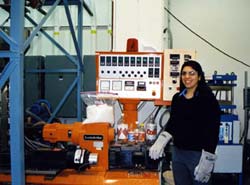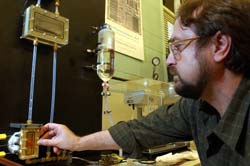Process Engineering
This special field revolves around processes for modifying material properties (milling, cooling), composition (filtration, distillation) and type (oxidation, hydration).
Valuable information is available on a broad range of technologies including material separation, laser processes, measuring techniques and robot engineering in addition to testing methods and coating and materials analysis processes.

New connecting system for water pipes
Laying water mains has always been a time-consuming job. Each section must be laid, joints welded, the interior checked for heat damage, and any damage repaired. Then the whole thing has to be encased in concrete if the ground is uneven. Now EUREKA project DRIVE-LOCK is about to make the process quicker and cheaper.
The French and Swiss partners in the DRIVE-LOCK project have developed a new conical interlocking system that joins steel water pipes together quickly and combines the strength o

From wireless to wearable technology
Technology has moved beyond wireless and pocketable to wearable. Clothes and accessories can serve a wider range of purposes than we’re currently accustomed to. Wearable technology produced by a Finnish smart clothing R&D center and its partners is selling well.
The smart clothing and wearable technology concepts are based on a permanent integration of clothing and technology. Clothes can be made ‘smart’ by adding intelligent features such as information technology and by using special fibre

Engineers design new optical microprobe to detect subsurface organ abnormalities
Photonics and ultrasound engineering researchers from Duke University and The George Washington University have collaborated to design an optical scanner miniaturized enough to be inserted into the body, where its light beams could someday detect abnormalities hidden in the walls of the colon, bladder or esophagus.
The experimental device, called an “electrostatic micromachine scanning mirror for optical coherence tomography,” is described in an article published in the April 15, 2003, issu

NC State Researchers Develop New Plastic Recycling Process
Plastics are everywhere these days, but current recycling techniques allow only a very limited portion to be reclaimed after initial use. Researchers in the Department of Chemical Engineering at North Carolina State University, working to change that, have developed a unique recycling process for some of the most common kinds of polymers.
The familiar soda bottle is made of a plastic called polyethylene terephthalate (PET). These bottles are ubiquitous, yet recycling them poses challenges, p

Tiny bubbles are key to liquid-cooled system for future computers
Purdue University researchers have made a discovery that may lead to the development of an innovative liquid-cooling system for future computer chips, which are expected to generate four times more heat than today’s chips.
Researchers had thought that bubbles might block the circulation of liquid forced to flow through “microchannels” only three times the width of a human hair. Engineers also thought that small electric pumps might be needed to push liquid through the narrow channels, incre

Carnegie Mellon, NASA to develop robot illustrating how to seek life on distant planets
A team of Carnegie Mellon University and NASA scientists will travel to the Atacama Desert in northern Chile in April to conduct research that will help them develop and deploy a robot and instruments that may someday enable other robots to find life on Mars. The researchers will be using the Atacama, described as the most arid region on Earth, as a Martian analog.
The group is funded with a $3 million, three-year grant from NASA to the university’s Robotics Institute. They are collabo